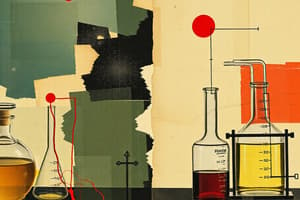Podcast
Questions and Answers
What are reactants?
What are reactants?
- Solid formed from mixing two liquids
- Substances present before the change takes place (correct)
- Substances that slow down a reaction
- Substances that are formed after a chemical reaction
What are products?
What are products?
- Reactants in the chemical reaction
- Substances that are formed after a chemical reaction (correct)
- The energy released during a reaction
- The catalyst used in the reaction
What is a precipitate?
What is a precipitate?
A solid formed from mixing two liquids.
What is a catalyst?
What is a catalyst?
What is a neutralization reaction?
What is a neutralization reaction?
Define oxidation-reduction (redox) reaction.
Define oxidation-reduction (redox) reaction.
What is oxidation?
What is oxidation?
What is reduction?
What is reduction?
What is a combination reaction?
What is a combination reaction?
What happens in a decomposition reaction?
What happens in a decomposition reaction?
What is a single replacement reaction?
What is a single replacement reaction?
What characterizes a double replacement reaction?
What characterizes a double replacement reaction?
What does the equation 4Fe(s) + 3O₂(g) ---> 2Fe₂O₃(s) represent?
What does the equation 4Fe(s) + 3O₂(g) ---> 2Fe₂O₃(s) represent?
What does the equation 2HgO(s) ---> 2Hg(s) + O₂(g) represent?
What does the equation 2HgO(s) ---> 2Hg(s) + O₂(g) represent?
Identify the type of reaction: Zn(s) + 2HCl(aq) ---> ZnCl₂(aq) + H₂(g)
Identify the type of reaction: Zn(s) + 2HCl(aq) ---> ZnCl₂(aq) + H₂(g)
Determine the type of reaction: AgNO₃(aq) + NaCl(aq) ---> AgCl(s) + NaNO₃(aq)
Determine the type of reaction: AgNO₃(aq) + NaCl(aq) ---> AgCl(s) + NaNO₃(aq)
What type of reaction does the equation HCl(aq) + NaOH(aq) ---> NaCl(aq) + HOH(l) represent?
What type of reaction does the equation HCl(aq) + NaOH(aq) ---> NaCl(aq) + HOH(l) represent?
Identify the type of reaction represented by the equation Zn⁰ + 2H¹⁺ ---> Zn² + 2Cl¹⁻ + H₂⁰.
Identify the type of reaction represented by the equation Zn⁰ + 2H¹⁺ ---> Zn² + 2Cl¹⁻ + H₂⁰.
Flashcards are hidden until you start studying
Study Notes
Types of Chemical Reactions
- Reactants: Substances that exist before a chemical change occurs.
- Products: Substances formed as a result of a chemical reaction.
Key Reaction Types
- Precipitate: Results from mixing two liquids, leading to the formation of a solid.
- Catalyst: A substance that alters the speed of a reaction (usually enzymes) without being consumed itself.
Neutralization Reactions
- Defined as a type of double replacement where an acid reacts with a base, producing salt and water.
- General formula: Acid + Base → Salt + Water (e.g., HCl + NaOH → NaCl + H2O).
Oxidation-Reduction (Redox) Reactions
- Classify reactions based on the transfer of electrons between atoms or ions.
- Oxidation: Defined as the loss of electrons.
- Reduction: Defined as the gain of electrons.
Other Reaction Types
- Combination Reaction: Occurs when two or more small molecules combine to form a larger molecule (e.g., 4Fe(s) + 3O₂(g) → 2Fe₂O₃(s)).
- Decomposition Reaction: A larger molecule breaks down into smaller molecules or atoms (e.g., 2HgO(s) → 2Hg(s) + O₂(g)).
- Single Replacement Reaction: One atom in a molecule is replaced by another atom (e.g., Zn(s) + 2HCl(aq) → ZnCl₂(aq) + H₂(g)).
- Double Replacement Reaction: Involves two molecules that exchange parts (e.g., AgNO₃(aq) + NaCl(aq) → AgCl(s) + NaNO₃(aq)).
Studying That Suits You
Use AI to generate personalized quizzes and flashcards to suit your learning preferences.




